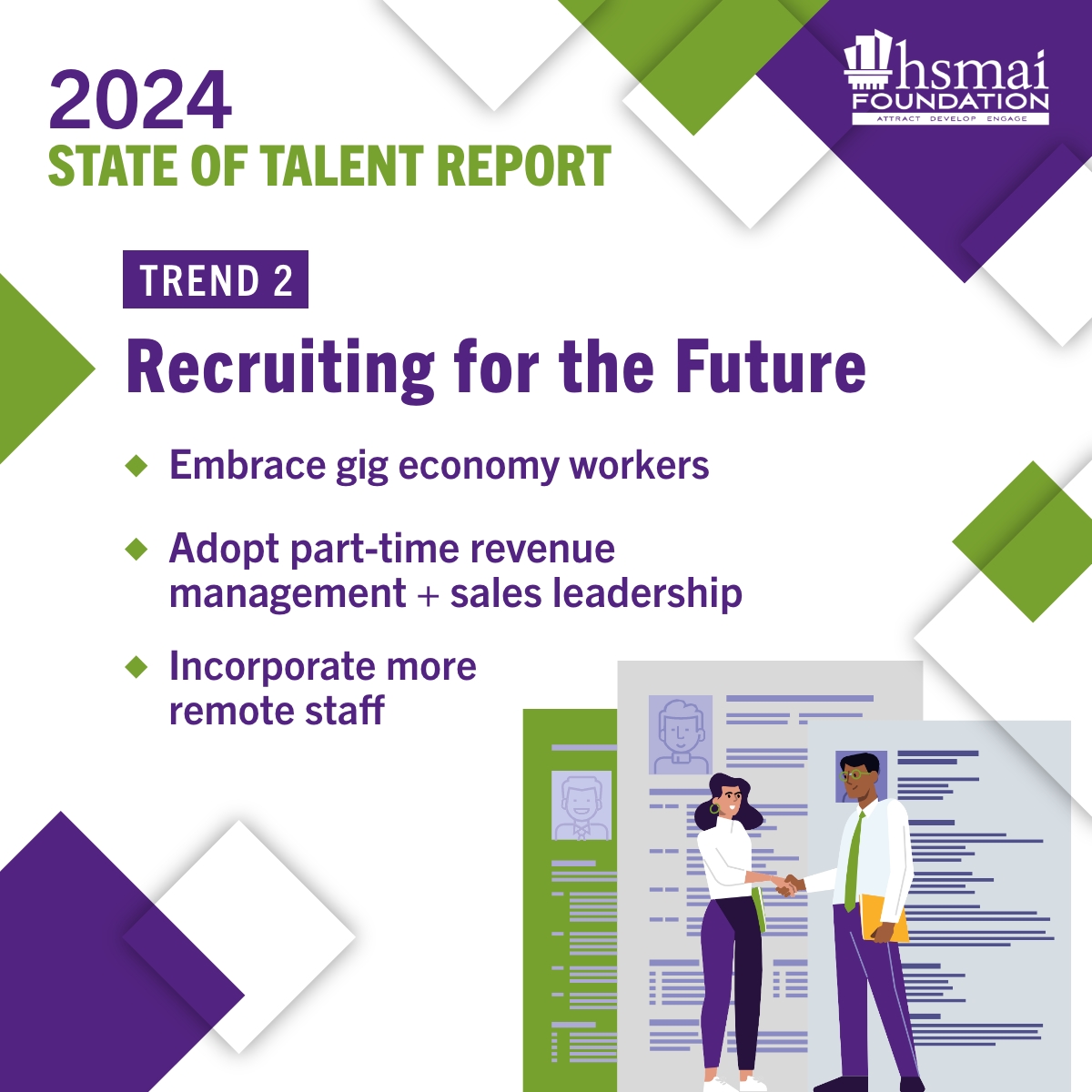Transforming Talent Sourcing in the Hotel Industry: The Rise of the Gig Economy and Fractional Staffing Models
In the recently released HSMAI Foundation Special Report: The State of Hotel Sales, Marketing, and Revenue Optimization Talent 2023-2024, the second trend investigates how the gig economy and fractional staffing models are changing talent sourcing. Employers in the hospitality industry must adopt a marketing mindset to effectively attract and source the best talent. As businesses strive to fill critical roles in the post-pandemic world, it has become increasingly evident that traditional hiring approaches are insufficient to meet the growing demand for skilled professionals. The persistent shortage of skilled labor, especially in the hospitality sector, has created a challenging workplace environment. In North America, only 31% of workers report full engagement, with the majority either quietly quitting or engaging in negative behavior (Gallup, 2023). This talent gap remains a top concern globally, particularly in the United States, where over 75% of HR leaders identify it as a significant hurdle (Dean, 2023).
 In a 2023 report by the World Economic Forum (World Economic Forum, 2023) businesses now perceive talent shortages as a more significant limitation to their performance than a shortage of capital. The scarcity of essential skills in the local labor market is seen as a more formidable barrier to transformation across various industries (Dean, 2023).
In a 2023 report by the World Economic Forum (World Economic Forum, 2023) businesses now perceive talent shortages as a more significant limitation to their performance than a shortage of capital. The scarcity of essential skills in the local labor market is seen as a more formidable barrier to transformation across various industries (Dean, 2023).
As labor and talent challenges persist, independent contractors and the gig economy have become integral parts of the workforce. Between 2016 and 2021, the gig economy experienced a 31% growth, with projections indicating that contract employees in the U.S. will surpass 90 million by 2028 (McKinsey & Company, 2023).
McKinsey’s American Opportunity Survey (AOS) found that 36% of employed respondents, equivalent to 58 million Americans, identify as independent workers. This figure includes not only gig workers but also highly paid professionals in various fields, highlighting the diverse nature of independent work.
A shortage of workers with specific skills has led to a growing acceptance of the Project Economy model, where workers are hired for specialized projects. This approach appeals to those who prefer the gig lifestyle and offers flexibility in employment arrangements.
A report by Strategic Solutions Partners titled “Moving Beyond the Staffing Crisis” (Hoch, 2023) underscores the importance of gig workers in the hospitality industry. Gig workers are essential in filling roles that cannot be adequately staffed by full-time employees. They offer flexibility, crucial skills, higher pay, and the ability to work remotely.
The hotel industry has evolved significantly, and the surge in gig labor has proven valuable, especially for management companies and brands. Gig labor allows swift access to skilled professionals for specialized roles. This agile approach enables companies to address specific needs promptly and effectively, such as new property openings, sales leaders with strong business development skills, Go-To-Market plans for new properties or properties that require repositioning.
The use of fractional revenue management and sales leadership has been a trend for several years. As sourcing experienced talent in these fields becomes even more challenging, this model is gaining more traction. Tammy Gillis, a recognized sales industry expert, highlights the attractiveness of the gig labor model for sales professionals. She states, Now more than ever, sales professionals are looking for work/life balance, and culture is one of the most important deciding factors in choosing their next employer. Many salespeople are tired of working on property and getting pulled into operations and want full-time remote or hybrid remote positions. They also value training, coaching, and support which the hotel industry does not consistently provide.
In this current labor market, attracting and retaining sales talent is challenging, and a fractional sales model allows hotels to focus on employee well-being and customer satisfaction without the burden of internal sales management. This is why many strong sales leaders are choosing fractional sales careers with organizations like Gillis and Associates. This offers them the ability to work from home in a dedicated sales environment with strong senior sales leaders that offer coaching, training, and sales enablement support.
Owners and operators are also increasingly considering the cost of client acquisition, and a fractional sales model can be a costeffective solution, typically being only 1/3 of the cost of bringing a full-time resource in-house. For management companies, this approach can serve as a stop-gap measure while they search to fill vacant on-property sales positions, ensuring they remain competitive with active selling initiatives still in progress.
The rise of gig labor is not a mere trend but a transformative force in the modern workforce landscape. For companies, it offers flexibility, specialized skills, and cost-effectiveness. Fractional talent models, especially in sales and revenue management, have become integral to the hotel industry’s success in adapting to post-pandemic challenges. As Bill Scanlon indicated, marketing to talent and having more personalized solutions to provide them with choice and fulfillment mirrors the kind of customer marketing all hospitality organizations are engaging in today, and they simply need to think of their employee base as another customer group. In addition, fractional employment solutions allow hotels, management companies, and brands to hire seasoned experienced talent at a lower cost that provides growth opportunities for their developing employees to have senior leader’s role modelling and supporting their learning journey.
Key Takeaways
- Competition for talent means recruiting requires a marketing mindset and dedication to employer branding.
- Gig and independent workers are growing in relevance and value.
- Fractional revenue management and sales leadership continues to grow— both employees and employers value fractional employment.
To read more about the top talent trends, download
the HSMAI Foundation Special Report: The State of Hotel Sales, Marketing, and Revenue Optimization Talent 2023-2024.
About HSMAI
HSMAI is a global organization of sales, marketing, and revenue management professionals representing all segments of the hospitality industry. With a strong focus on education, HSMAI leads the way in identifying and communicating trends in the hospitality industry. Operating as a leading voice for both hospitality and for sales, marketing, and revenue management disciplines, HSMAI connects its members with customers. Founded in the United States in 1927, HSMAI is membership organization comprising 5,000 members from 35 countries and chapters worldwide. Connect with HSMAI at hsmai.org.
